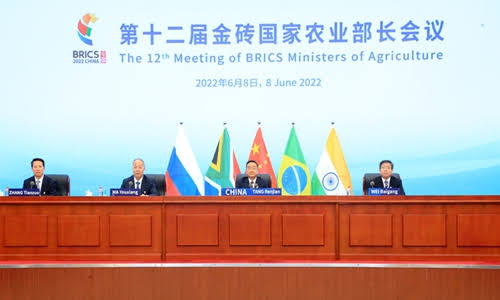BRICS a global pillar of stability

During recent times the international community has been witnessing the increasing strategic rivalry between the collective West on one side and Russia and China on the other. There is a split between Western and non-Western world. Only one country is standing like a rock and balancing both the sides with its very presence that is India.
This trend accelerated after the Ukraine crisis started in 2014 and got drastically boosted after the beginning of the Russian special military operation in Ukraine on February 24.
The US and its allies imposed unprecedented sanctions on Russia thinking that it will isolate that country from the global community. However, this policy has backfired. Former Italian prime minister Silvio Berlusconi said that the West had tried to isolated Russia but in doing so has been isolated from the rest of the world. His statement confirms the fact that the spilt between the collective West and non-Western world has really widened and there is an ongoing process because of multipolarity.
Today India and China are superpowers in themselves and there are many other major powers like Brazil, South Africa, Indonesia Egypt and other such other countries. Groupings like BIMSTEC, ASEAN and SSAARC too are economic blocs with huge potentials.
In this context the role of BRICS has become even more important at any stage of its existence for two reasons. First, it is a tool for its participants to preserve their independence in the political and economic decision-making from the West. Second, BRICS is an entity that ensures stability in the world affairs. It is aimed at making a geopolitical split less confrontational and smooth. It is a kind of insurance for the rest of the world when the West makes mistakes and destabilizes the situation.
Western entities including the G7, NATO or AUKUS are aimed at preserving dominance of the collective West led by the US. During recent trilateral meetings at the Shangri-La Dialogue, the US Secretary of Defense Lloyd Austin, Defense Minister Nobuo Kishi of Japan and South Korean Minister of National Defense Lee Jong-sup claimed that they saw challenges to the rules-based order in the Indo-Pacific in very much the same ways and shared determination based on their common interests and common values, to take actions together to bolster deterrence security and stability in the Indo-Pacific. In fact, these futile attempts are designed at pushing non-Western states to the global political periphery.
On the eve of the upcoming BRICS summit, it is appropriate to look again at this influential entity and participation of India, Russia and China. All three are pursuing constructive goals in the framework of three spheres, namely economic, political and security, and humanitarian areas.
Indian leadership shares the common approach that BRICS’ activity should be aimed at raising the entity’s effectiveness through solidarity and engagement. It should have an inclusive character. Russia and even China and India disagree with the Western promotion of the world order based on the rules made by the West without consent of the non-Western countries. Unlike Western states, activity within BRICS focuses on the strengthening of the central role held by the UN, G20 and international law as a whole.
In the face of growing strategic rivalry, BRICS partners share the necessity to make global governance institutions more representative involving states from the non-Western world. It is important that developing countries as well as states with shaping markets should be involved in the global decision-making. In this respect BRICS is a guarantee of such opportunity and it will do its best to bolster such steps inside BRICS. Russia is interested in coordination of BRICS’s position on crucial international issues at the key international forums. This synergetic approach will be more effective to deal with such issues.
Facing the current economic crisis, BRICS is acting as a pillar of stability in the world for non-Western countries. India, Russia and China came out against illegal Western sanctions. India is carrying out its bilateral trade with Russia. BRICS can play a constructive role in blocking all US attempts of applying its domestic law to punish other countries. One of the ways to diminish the impact of Western sanctions and outside interference is to minimize using Western national currencies in payments among BRICS members. This move can be bolstered by the activity of the New Development Bank (NDB) and Contingent Reserve Arrangement (CRA) that are supposed to give BRICS and developing countries more independence from IMF and the World Bank thus buttressing multipolarity.
BRICS will promote adherence to the WTO rules that are being breached by the West. It is vital as by doing so BRICS will protect developing economies that are vulnerable to Western economic malpractice.




